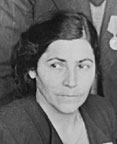Mirvarid Dilbazi: Difference between revisions
Hajji Piruz (talk | contribs) Azerbaijan democratic republic was not founded until 1918. |
and who said it was? |
||
| Line 3: | Line 3: | ||
'''Mirvarid Dilbazi''' ({{lang-az|Mirvarid Paşa qızı Dilbazi}}), ([[19 August]] [[1912]], [[Gazakh]] region – [[2002]], [[Baku]]) was an [[Azerbaijani people|Azerbaijani]] poetess. |
'''Mirvarid Dilbazi''' ({{lang-az|Mirvarid Paşa qızı Dilbazi}}), ([[19 August]] [[1912]], [[Gazakh]] region – [[2002]], [[Baku]]) was an [[Azerbaijani people|Azerbaijani]] poetess. |
||
She was born in the village of Musakoy located in the |
She was born in the village of Musakoy located in the Gazakh region in northwestern Azerbaijan. Both of her grandfathers, Haji Rahim and Abdurahman Dilbazi, were poets. In 1921, Mirvarid moved to [[Baku]] and got admitted to the newly established Female Boarding School. After six years of studying, Mirvarid started teaching at elementary school in [[Balajari]]. Upon graduation from [[Azerbaijan Pedagogical Institute]], she moved to [[Quba|Guba]] and continued teaching there.<ref>{{ru icon}} [http://nashvek.media-az.com/29/pamyat.html And death wouldn’t dare to cross it out!] Nash Vek. July 20, 2001. Retrieved June 14, 2007</ref> |
||
During her lifetime, Mirvarid witnessed [[Great Purge|Stalin's Repression]] of 1937, the tragic losses of [[World War II]], and the [[Nagorno-Karabakh war|Armenia-Azerbaijan conflict]]. Mirvarid Dilbazi's first poem, ''Women's Emancipation'', was published in 1927. Her first book, ''Our Voice'', followed in 1934. After that, she wrote numerous poems and children's books. Dilbazi has also translated works by writers such as [[Pushkin]], [[Khagani]] and [[Nizami|Nizami]]. In 1979, she was named "[[People's Poet of Azerbaijan]]". President [[Heydar Aliyev]] awarded her with the "[[Istiglal]]" (Independence) Order in 1998.<ref name="azerintl">[http://azer.com/aiweb/categories/magazine/73_folder/73_articles/73_dilbazi.html Oil Boom, Century of Tears] by Mirvarid Dilbazi. Azerbaijan International. Autumn 1999, #7.3</ref> |
During her lifetime, Mirvarid witnessed [[Great Purge|Stalin's Repression]] of 1937, the tragic losses of [[World War II]], and the [[Nagorno-Karabakh war|Armenia-Azerbaijan conflict]]. Mirvarid Dilbazi's first poem, ''Women's Emancipation'', was published in 1927. Her first book, ''Our Voice'', followed in 1934. After that, she wrote numerous poems and children's books. Dilbazi has also translated works by writers such as [[Pushkin]], [[Khagani]] and [[Nizami|Nizami]]. In 1979, she was named "[[People's Poet of Azerbaijan]]". President [[Heydar Aliyev]] awarded her with the "[[Istiglal]]" (Independence) Order in 1998.<ref name="azerintl">[http://azer.com/aiweb/categories/magazine/73_folder/73_articles/73_dilbazi.html Oil Boom, Century of Tears] by Mirvarid Dilbazi. Azerbaijan International. Autumn 1999, #7.3</ref> |
||
Revision as of 22:07, 23 June 2007

Mirvarid Dilbazi (Azerbaijani: Mirvarid Paşa qızı Dilbazi), (19 August 1912, Gazakh region – 2002, Baku) was an Azerbaijani poetess.
She was born in the village of Musakoy located in the Gazakh region in northwestern Azerbaijan. Both of her grandfathers, Haji Rahim and Abdurahman Dilbazi, were poets. In 1921, Mirvarid moved to Baku and got admitted to the newly established Female Boarding School. After six years of studying, Mirvarid started teaching at elementary school in Balajari. Upon graduation from Azerbaijan Pedagogical Institute, she moved to Guba and continued teaching there.[1]
During her lifetime, Mirvarid witnessed Stalin's Repression of 1937, the tragic losses of World War II, and the Armenia-Azerbaijan conflict. Mirvarid Dilbazi's first poem, Women's Emancipation, was published in 1927. Her first book, Our Voice, followed in 1934. After that, she wrote numerous poems and children's books. Dilbazi has also translated works by writers such as Pushkin, Khagani and Nizami. In 1979, she was named "People's Poet of Azerbaijan". President Heydar Aliyev awarded her with the "Istiglal" (Independence) Order in 1998.[2]
References
- ^ Template:Ru icon And death wouldn’t dare to cross it out! Nash Vek. July 20, 2001. Retrieved June 14, 2007
- ^ Oil Boom, Century of Tears by Mirvarid Dilbazi. Azerbaijan International. Autumn 1999, #7.3
External Links
- Poetry by Mirvarid Dilbazi. Azerbaijan International Magazine
